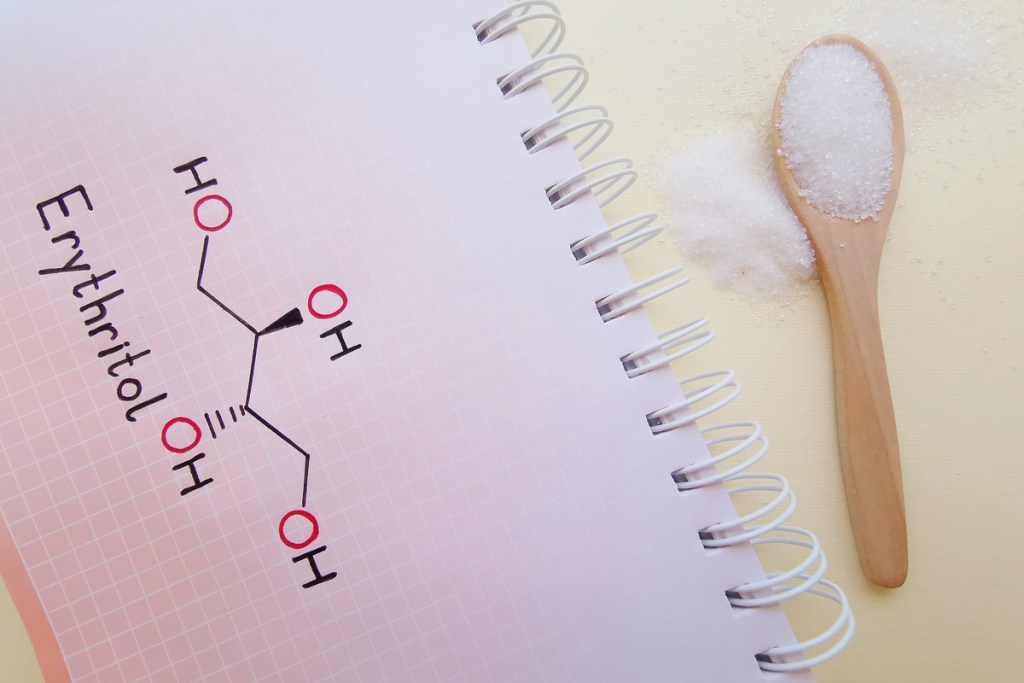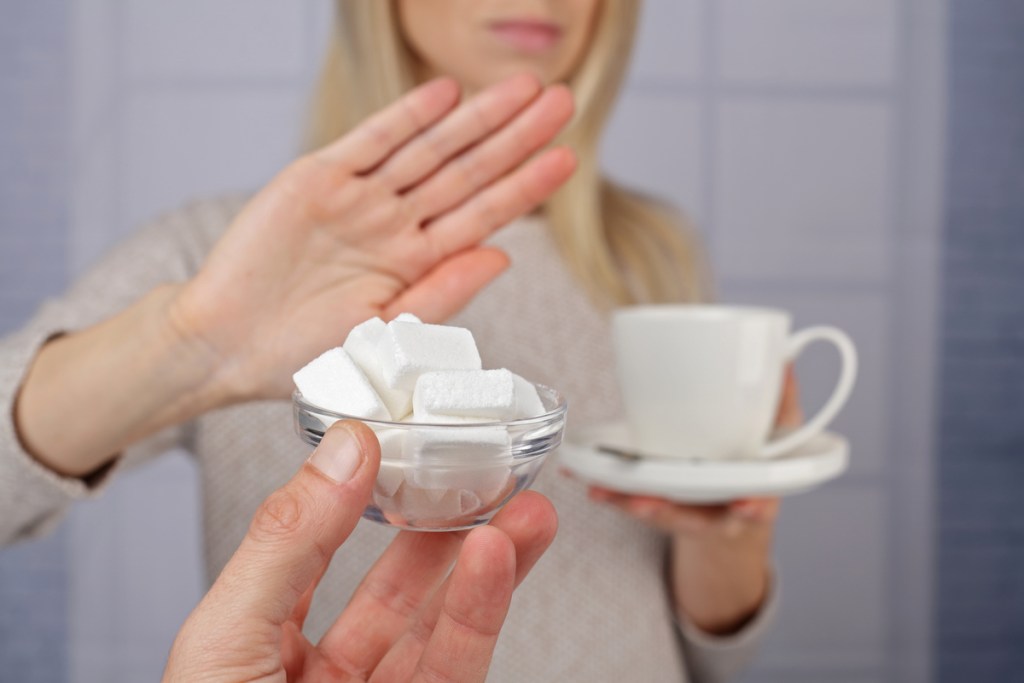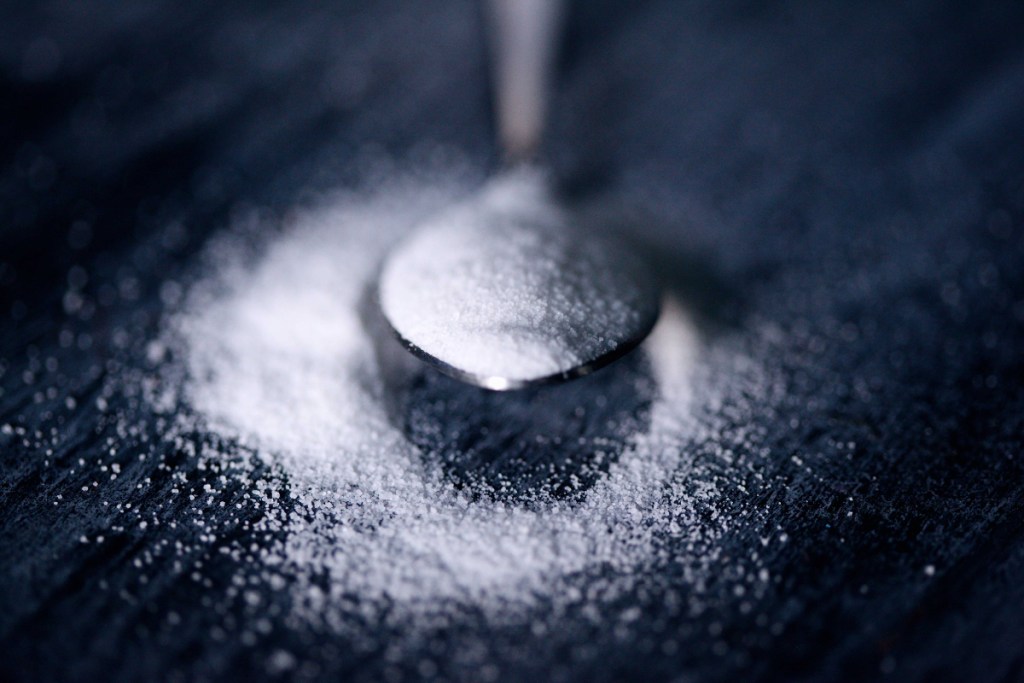Erythritol has gained huge popularity as a replacement for high-calorie sweeteners like sugar and corn syrup. This compound is one example from a class of chemicals called sugar alcohols that many Americans have taken notice of as they look to cut down on their sugar intake. Given the continued interest in fad diets and weight loss plans, there is great demand for and interest in this brand of sweeteners.
So how does erythritol stack up against traditional sugar? Here’s what you need to know.

What foods contain sugar alcohols like erythritol?
In addition to erythritol, other sugar alcohols include:
- Xylitol
- Sorbitol
- Maltitol
- Mannitol
- Lactitol
- Isomalt
Many different foods contain sugar alcohols, and if you see the “sugar-free” label on your favorite drink or snack, there’s a good chance it contains a sugar alcohol. These give artificial sweetness to low-calorie iterations of your favorite treats like candy, cookies, gum, sweetened beverages, toothpaste, and even mouth wash. It’s also good to note that, despite the similarity in the name, they are not the same as ethyl alcohol, the intoxicating substance found in alcoholic beverages.

Is erythritol really a better option for dieters?
When devising a weight loss or fitness plan, sugar and carbohydrates tend to be the first thing dieters look to reduce or eliminate. Sugar alcohols like erythritol can be very helpful in this process, as you can enjoy your favorite treats like cheesecake, ice cream, and sweet tea without the high calorie count from the sugar.
Scientific studies found that sugar alcohols are safe, and your body generally tolerates them well. However, there are still some side effects to be aware of. They are not serious or life-threatening but can cause discomfort. Unlike other foods that take a regular path through your digestive system, your body can’t digest sugar alcohols until they reach the colon or large intestine, where the natural bacteria break down the substance. This process creates gas in your large intestine and can lead to bloating, gas pain, diarrhea, and indigestion.
These side effects tend to happen only when sugar alcohols are consumed in large quantities. Too much of anything, even a “healthier” sugar substitute, can be unsafe, so always be sure to read the labels and consume in moderation.
Perhaps the most important note, particularly for those looking to watch their waistline, is that erythritol and other sugar alcohols can still cause you to gain weight because, when consumed excessively, this substance can raise blood sugar levels. This is a particular point of concern for diabetics as well.

Health benefits of erythritol vs. sugar
Now for the million-dollar question: Is erythritol better than sugar and other traditional sweeteners? That fully depends on your definition of “better.”
A 2019 study found that sugar alcohols led to lower blood pressure after meals when compared with traditional sweeteners like sugar. Additionally, among all the sugar alcohols, erythritol has the lowest calorie count. Sugar contains approximately 4 calories per gram, other sugar alcohols average 2.6 calories per gram, and erythritol comes in at only 0.24 calories per gram.
Unfortunately, however, erythritol can’t quite capture the taste of sugar that we all know, love, and crave. These sugar alcohols sometimes have a bit of acidity and bitterness, so it might take some time to get acclimated to the new flavor profile. When determining what sugar substitutes you want to try, keep in mind that there isn’t a one-size-fits-all solution. You might need to experiment with different varieties and amounts before landing on the product that works best for you.
Sugar alcohols are popular with dieters because they are a safe, lower calorie alternative to sugar. However, they also come with a range of health benefits, as lowering your sugar intake can reduce your risk of heart disease and prevent your blood sugar levels from spiking. Unless your health care professional indicates otherwise, erythritol can be an excellent ally in your weight-loss goals, especially for those who need a sweet treat to boost their energy in the middle of the day. This product is available in most general and specialty grocery stores, so add it to your list and check it out for yourself.
BlissMark provides information regarding health, wellness, and beauty. The information within this article is not intended to be medical advice. Before starting any diet or exercise routine, consult your physician. If you don’t have a primary care physician, the United States Health & Human Services department has a free online tool that can help you locate a clinic in your area. We are not medical professionals, have not verified or vetted any programs, and in no way intend our content to be anything more than informative and inspiring.



